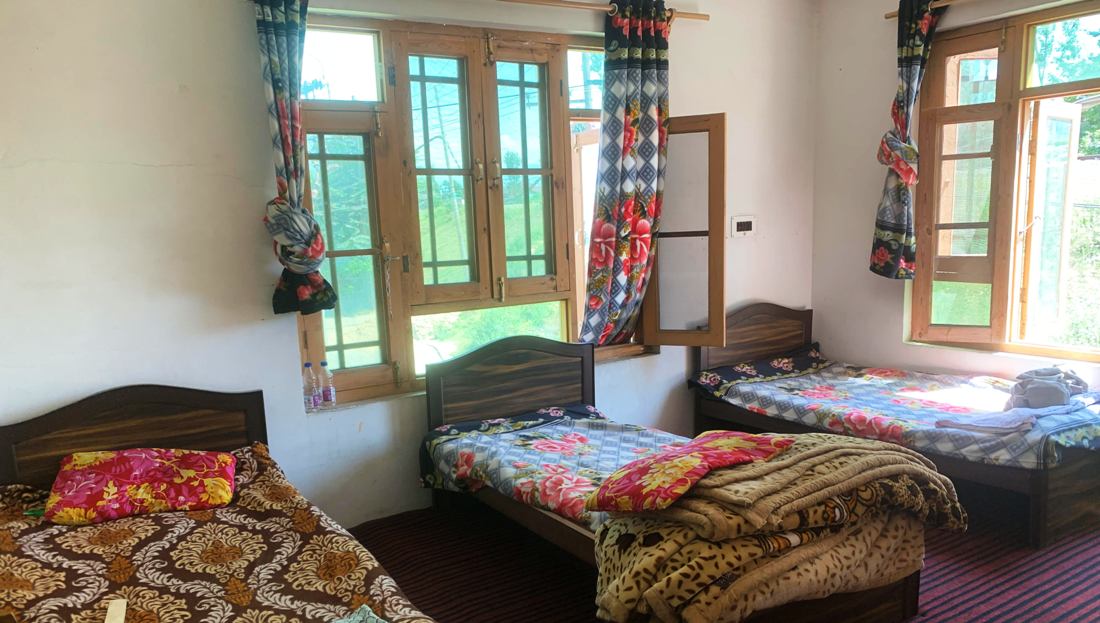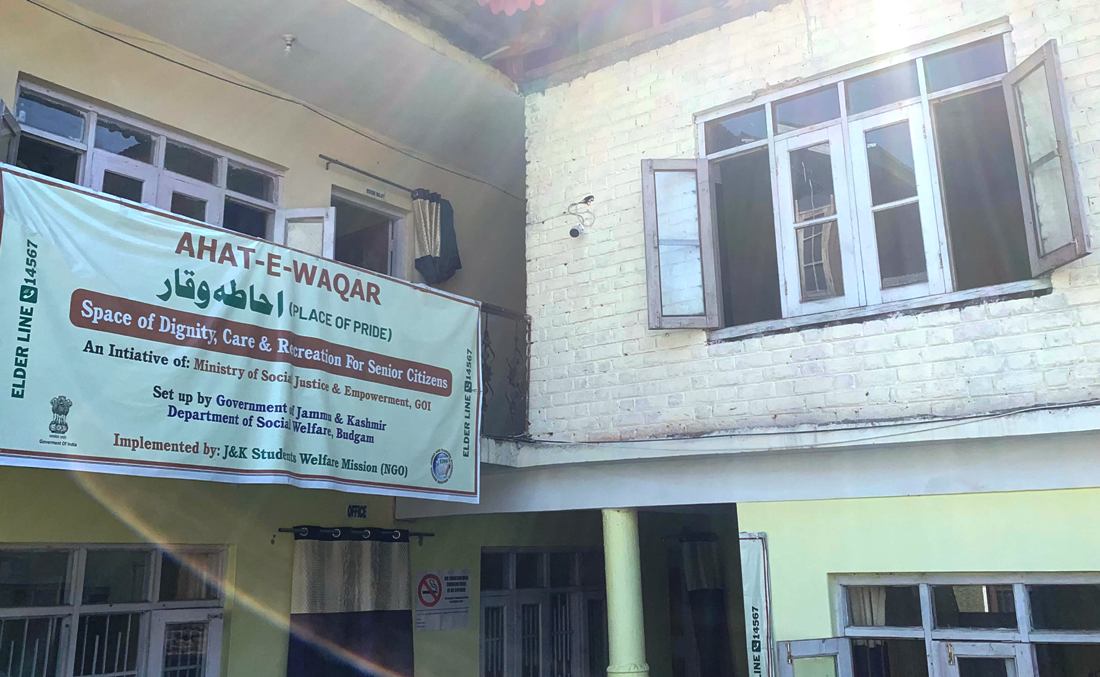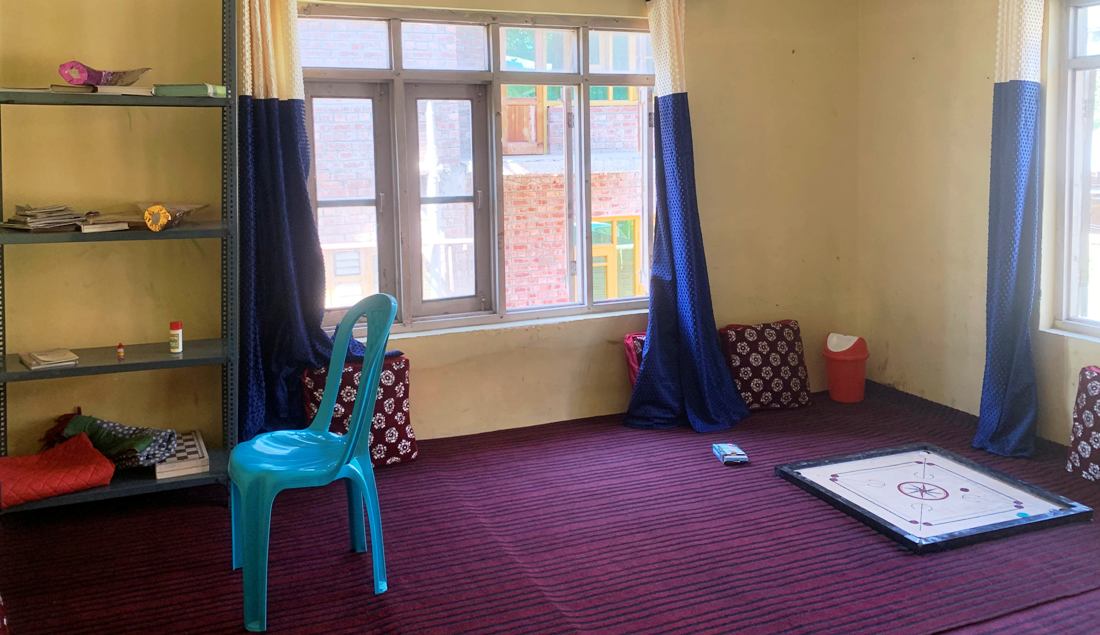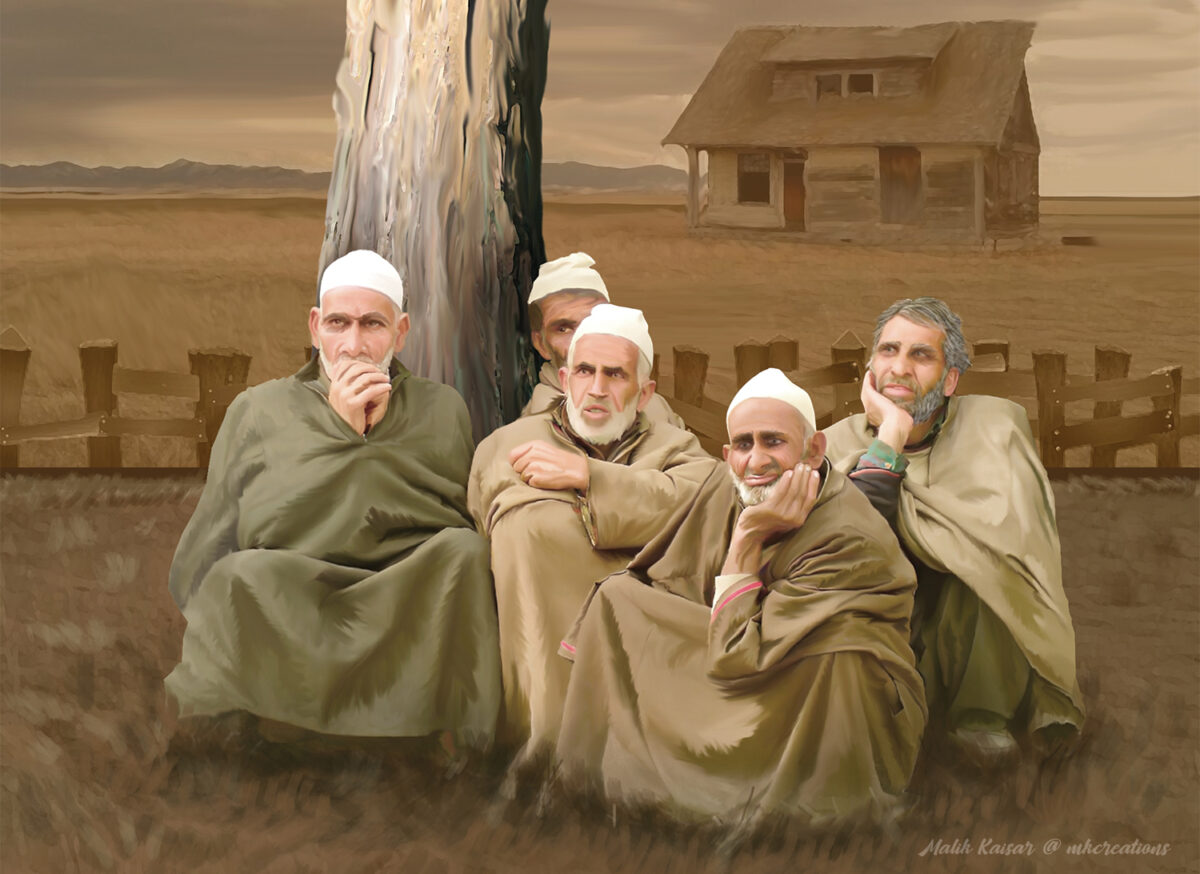After they raise families and give it what they afford, sections of the elderly population feel lonely, neglected and in rare cases abandoned. While a chain of Old Age Homes has started taking care of some of these men and women, Syed Shadab Gillani met the experts, caregivers and home managers to understand the factors that drove these senior citizens to these homes.
In Budgam, just a few kilometres from the market stands an unassuming institution. Though resembling a government school, it is Budgam’s first and only Old Age Home, named Ahata e Waqar, the premises of dignity. Its off-white paint shows signs of age.
With complex family dynamics and societal challenges on the rise, this centre bridges gaps and offers comfort. Housing a diverse group, it sustains 37 souls, through day-care and permanent residency.
Eight residents stay permanently in the home, seeking relief from personal struggles and family disputes. “We are from Budgam,” one resident proudly declares, emphasising the centre’s local roots. Here, they find not just food, shelter, and clothing but also legal support.
Dr Zubair Saleem, Senior Geriatric Consultant and Gerontologist, and Director of Gauri Old Age Mission, shares a heart-breaking story. A father, once a successful businessman, put everything under his wife’s name. When he fell ill during the floods in 2014, his sons manipulated their mother into giving them power of attorney, taking control of the business and forcing her out of her own home.
Today, the mother and her daughter reside with other relatives, lacking a place of their own. It is a heartbreaking situation, but this home remains a sanctuary for those in need, offering care, support, and a second chance at family ties.

Old Age and Loneliness
Seniors face hardships managing health without children’s support or as they are left behind when adult children seek opportunities abroad or at off-station locations.
Zakir Ali (name changed) recalls the octogenarian couple next door. Their once vibrant home, filled with joy, changed when their sons moved to Europe and got permanent jobs. “A family lived here for years. Two sons left, visiting occasionally, but their absence left the parents isolated,” Zakir said.
The couple’s profound loneliness was palpable. “It was a heart-wrenching experience. Their home became desolate, and despite being together, the absence of family left them profoundly lonely.” Tragedy struck as the wife passed away mysteriously, followed by her husband months later. “A distressing end for a once joyful family.”
Dr Saleem emphasises the younger generation’s lack of awareness about caring for ageing parents who shaped their lives. “Our achievements owe much to their efforts,” he said, sharing a troubling instance. “Two successful sons neglected their elderly parents, left them without care.” The ill father lacked company in the hospital, and despite their financial stability, isolation and an exploitative aide left the couple lonely at home.
In Ganderbal, a nine-month-old home offers respite for seasoned lives. “We established a 25-bed senior home,” Sami Wani, its director said. Seven seniors find refuge with 24-hour care. “Many seek our home due to the lack of family support.” Inside, they receive food, lodging, activities, games, and medical care, creating a holistic environment.
Making a Living
In Lal Chowk’s bustling streets, where the city’s heartbeat reverberates, a silver-haired figure sells street snacks. Near the Batte Galli (Food Street), Ghulam Muhammad, in his late seventies, has manned his humble stall for four decades – a steadfast fixture amid the shifting urban landscape.

“I married off two daughters with the earnings of these snacks,” declares Ghulam Muhammad, eyes reflecting a lifetime. “As long as I am able, I will toil responsibly for my wife and me.”
His sentiment rings true for Ali Mohammad, now in his early nineties, unlocking his Chanapora Kiryana shop at dawn despite his frail, limping frame. “An accident left me limping three years ago. My children have families, my wife is gone. The solitude is vast, so I persevere.”
Their unwavering spirit persists regardless of gender, like seventy-year-old Gujjar lady Hajira, the sole provider for seven. Immobilized husband, scattered daughters, deceased son with orphans, she became a house help and is successfully stitching survival.
“I take diverse roles in homes, sustaining my family. People kindly give food, clothes, and books,” shares Hajira from her tent. “I know my age is challenging, yet what alternative exists?”
Like countless others, despite age and frailty, Hajira musters her strength to shield her family from despair.
Professional Perspective
In the halls of Dr Saleem’s clinic, poignant stories unfold, shedding light on the challenges faced by the elderly. Among these narratives, one from the grim year 2020 stands out—a woman, devastated by Covid19, left to navigate life’s challenges with two married sons who display heart-wrenching neglect.
“It is disheartening,” Dr Saleem reflects, “that she must rely on our clinic for essential care and medications.” Her sons’ justification for their lack of support speaks volumes about their indifference: “If one of us is not helping, why should any of us?”
Saleem, with deep concern, highlights the distressing situation faced by elderly parents. “Sadly, a concerning number of senior citizens are trapped in the web of elder abuse. This insidious problem takes various forms: cruelty, hurtful words, neglect of basic needs, solitary confinement without care, and even outright abandonment by their children. During medical consultations, I have seen that nearly half of the elderly individuals I meet have endured mistreatment, often at the hands of their adult children. What is even more heart-wrenching is that it is often their sons, the ones who should provide unwavering care.”
However, Saleem notes that daughters often step up as a source of consolation in these dire situations. “I have observed that unmarried sons and daughters often become primary caregivers,” he remarks.
He shares the story of a family with three sons and two daughters. As the sons got married and established separate households, their parents were left in solitude with only each other.

“But,” Saleem continues, “it was the youngest daughter who willingly took on the responsibility of caring for her ageing parents. With unwavering devotion, she ensured their needs were met and their well-being was safeguarded. She embodied filial love and duty, becoming their devoted caretaker. When she eventually married, the dynamics changed, and she left her parents’ home to join her spouse, leaving behind an unfulfilled responsibility in her parents’ care.”
With her departure, the burden of caring for their ailing parents remained unfulfilled. Surprisingly, her brothers chose not to take on this responsibility, citing potential disruptions in their own households as their reason for hesitance.
Dr Saleem poignantly emphasises that tragically, the youngest daughter’s unwavering dedication to her parents inadvertently strained her marital relationship. “Her fervent commitment to her parental duties strained her relationship with her husband. The unequal allocation of her time and emotional energy led to irreparable rifts. Over time, these rifts widened, culminating in the decision to part ways through a divorce.”
These situations are not so uncommon. Farooq Ahmad was the eldest when his father passed away. A resident of Court Road, now living in Batamaloo, he chose to marry his younger brother. Soon, the brother started living separately from his mother and brother. Eventually, Farooq married himself but his wife refused to take care of his aged mother. Tensions mounted to the extent that they separated. For the last 20 years now, Farooq has literally shadowed his mother.
“I put her in a wheelchair in the morning and got her to Court Road. For the entire day she is with me in her wheelchair as I sell tea,” Farooq said. “By 6 pm, we go home and then I start cooking.” It may be snowing, raining or very hot, but the son and mother are near the Court Road tea stall.
The Social Landscape
Dr Javed Ahmed, an Assistant Professor in the Department of Social Work at the University of Kashmir, offers insights into the emergence of old-age homes in Kashmir. He notes that when society deems something necessary, it inevitably acts, irrespective of resistance or acceptance. “Our society has undergone significant transformations and experienced numerous pressures, resulting in family conflicts,” Dr Ahmed remarks.
He emphasises the evolving social dynamics as a primary catalyst for family discord. “Today, materialism often clouds our perspective, and the elderly are perceived as liabilities. Yet, grandparents can contribute significantly to their grandchildren’s development and the overall family unit.”

Discussing the increasing prominence of old-age homes, Dr Ahmed asserts, “In cases of rampant abuse, where can the elderly turn? Institutionalisation must be a last resort, albeit an essential one. Old-age homes are not a solution but rather a final refuge. When we examine the stories of abused individuals, we find instances where they have nowhere else to go. These individuals, despite their wealth and possessions, lack the one thing that matters most—family.”
Delving into the impact of modernisation and its nexus with changing social dynamics, he said various aspects of life such as child education, employment, and lifestyles get impacted. He underscores the importance of day-care facilities for the elderly in situations where all family members are occupied with work. While these facilities may not provide the emotional care found within families, they do offer safety and essential care, addressing the elderly’s basic needs.
Advocating for incorporating these issues into the educational curriculum, he suggested asserting that early exposure to such concepts can significantly shape children’s psychology. He suggests that society should not dismiss the idea of old-age homes but instead contemplate their role and potential to awaken the younger generation to their responsibilities.
Drawing from these insights, Dr Ahmed shares the story of Sameena (name changed), a 22-year-old who lived with her grandmother for a decade and acknowledges the profound impact of this experience. Sameena believes that her time with her grandmother has nurtured her tolerance, patience, and composure. She expresses disappointment regarding the rise of old-age homes in Kashmir, deeming the abandonment of the elderly as heartless and emphasizing the need to preserve traditional family values.
An official from Srinagar Old Age Home recounts a recent success story, where an individual sought refuge for approximately 20-25 days amidst familial strife. The organisation intervened, providing legal and counselling support, ultimately facilitating a reconciliation with the family.
Saira (name changed), aged 25, embodies the values of family unity and support. She resides in Srinagar and has cared for her maternal grandparents for five years. Saira stepped into this role when her sole maternal uncle relocated abroad with his family, leaving the elderly couple in solitude.
“I had to shoulder the responsibility because they were alone,” says Saira, who holds a master’s degree and is currently seeking remote work opportunities to care for her ailing grandparents. She describes the sacrifices she has made, forsaking the comfort of her own home to ensure their well-being. Saira reflects on the bittersweet emergence of old-age homes, recognising them as a ray of hope for abandoned elderly individuals, even as societal values seem to be shifting away from traditional family bonds.
She laments the current state of society, where material pursuits often lead children to neglect their ageing parents. Saira concludes by emphasizing the importance of being present for one’s elderly family members, even when distant geographically, as their twilight years demand the compassion and care they deserve.
In an inspiring story, a young girl whose mother passed away and was abandoned by her father started living with her frail and aged grandma. For the last many years, they have been like mother and daughter. After graduating from Srinagar when she got admission to a good university, she drove with her grandmother. They live together.
The fall of Kashmir’s traditional joint family set-up, more so in urban spaces, has triggered a crisis for two generations at the same time – the eldest and the youngest. Normally when the parents age and pave the way for their children to earn and manage the family, the grandchildren invariably are taken care of by the grandparents. They used to inculcate in them the family value system, oversee their education and ensure they were not malnourished. This system has taken a toss in the urban spaces particularly, and in the periphery at small scale. This is reflected in the problem the two generations face.
Old Age and Islam
According to Islamic scholar Mufti Abdullah Nadvi, “it is not merely an option but an obligation for individuals to treat their parents with kindness and respect.” He underscores that “the Qur’an explicitly directs us to heed our parents’ words and fulfil their requests.” Mufti Abdullah emphasises that disregarding parental guidance and neglecting their welfare is a grave transgression.
Furthermore, he refers to a Hadith from Sahih al-Bukhari, highlighting the Prophet of Islam’s assertion that “failing to demonstrate loyalty and respect towards one’s parents precludes forgiveness, even on the holiest of nights, such as Layla tul-Qadr”
Islamic scholar Maulana Nadeem Nadvi adds depth to this perspective by highlighting that, in Islam, parents hold an unparalleled revered place. He references Surah Luqman’s verses 13-15 verses, which emphasise the alignment of Allah and parents in terms of reverence.
Maulana Nadwi asserts that “Allah commands children to obey their parents and fulfil their wishes.” However, he clarifies that there is an exception – if parents command their child to commit a sinful act contrary to Islamic teachings, the child is not obligated to obey.

Regarding the establishment of elderly care facilities in Kashmir, Mufti Abdullah deems such endeavours as undesirable and contrary to Islamic principles. Maulana Nadeem accentuates that, “from an Islamic perspective, the concept of old age homes does not align with our religious values.” While such facilities may be necessary in societies where children are absent due to migration, and influenced by European culture, they do not conform to Islamic teachings.
While the journey of old age homes has faced initial community opposition, concerns tied to religious compatibility have been addressed. Through workshops and personal interactions, scepticism has transformed into support.
As Dr Saleem points out, sometimes seemingly drastic measures are logical choices in the face of neglect. While the notion of placing elderly parents in facilities contradicts tradition, it becomes a necessity to ensure proper care.
The spirit of inclusion extends beyond internal interactions, as the organisation opens its doors to arranging interactions between residents and children without parents. The focus is on creating beneficial experiences for all involved.
Infrastructure and Facilities
In Srinagar, the residents of this Senior Citizens Home, reflect the diversity of human life. With a current roster of 25 registered individuals, this establishment becomes a microcosm of individual stories, each painted with its unique colours.
At its core, this home stands for holistic care. “We cater to all their basic needs,” the official assures. The residents simply need to arrive and find respite. The home offers amenities such as TV for entertainment, ensuring that their expenses are met, and creating a comfortable environment.
Each day unfolds as a chapter of purpose. “We take care of all their needs, including medical check-ups, counselling, and providing them with meals,” explains the official. “We arrange outings for them twice a month, offer physiotherapy, and ensure they have a comfortable and engaging environment to spend their time in.”
Behind the scenes, a dedicated team of five individuals weaves the threads of this heaven. Night staff, a cleaner, a cook, and two main personnel form the backbone, investing time and effort to ensure residents’ comfort.
“Currently, we are running the centre without external funding,” the official explains. While exploring additional funding sources may be on the horizon, the core mission remains unaltered.
The services of the Budgam Centre transcend the physical realm. Medical assistance, including medicines, offers a lifeline to those in need of regular care. However, the frequency of medical check-ups is limited to twice a week for major cases, showcasing the dedication of the centre’s limited staff.
One of the centre’s remarkable features is its focus on unity and reconciliation. With a robust staff of 11, the centre aims to mend relationships and bring families back together through counselling and support. “Our primary goal is to reunite families,” affirms a staff member, their commitment to unity evident in every aspect of their operation.
At the heart of their mission at the Ganderbal old age home lies the promise of health and well-being. “We have our own nurse available for emergencies, and if necessary, we send beneficiaries to local hospitals for medical treatment. Our nurse also provides regular care, including physiotherapy and exercise sessions,” reassures Sami Wani, highlighting the attention devoted to residents’ physical vitality.
“Yes, visitors come for day events and on special occasions. For instance, during the recent International Senior Season Day, we had 82 people attending,” he reveals, underscoring the role the home plays in fostering connections.
Behind the scenes, a dedicated team of twelve staff members ensures that the home’s promise is fulfilled. “We have a total of 12 staff members, comprising both full-time and part-time roles, including nursing, medical care, yoga therapy, cooking, cleaning, and administration,” Wani explains, shedding light on the heart of their operations.
The General Perspective
Akhoon Ashraf, Deputy Director of Administration at the Social Welfare Department in Kashmir, highlighted the central government’s initiative for senior citizens. This scheme, overseen by the Ministry of Social Justice and Empowerment, extends to every district in India. Ashraf explained that there are currently eight old age homes in Kashmir, with two more expected to become operational soon. These homes are managed by various NGOs and receive support from the ministry.
Regarding the selection process for running these homes and funding, Ashraf explained that any NGO can apply online, and the ministry shortlists those that meet the criteria. Funding for all the necessary facilities is in progress, although it involves a lengthy procedure. This initiative is relatively new in Kashmir, which accounts for the delay.
Ashraf also mentioned the existence of a daycare facility in the Chanapora area of Srinagar known as Ahata e Waqar. This recreational facility is a collaborative project involving the District Legal Service Authority (DLSA), Social Welfare Department, and Health Department, established in 2018. Its primary goal is to provide senior citizens with a space where they can spend time and enjoy each other’s company. Initially, the facility received approximately 200 registrations within a month of its establishment. However, it temporarily closed due to the Covid19 outbreak but has since resumed operations and received positive responses from the community.
In a world where the pace of life seems to accelerate with each passing day, the existence of old age homes has emerged as a sanctuary for the elderly. Dr Saleem urges society to remember that the challenges of old age might sometimes lead parents to act unfairly, but that should not justify responding to them with neglect or unkindness.
These institutions provide not only shelter but also a sense of belonging and care for those who may have been abandoned by their own children. Yet, beneath the comfort and solace they offer, lies a poignant question: Why are they needed in the first place?















